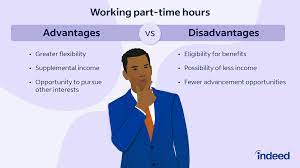In the ever-evolving landscape of work and employment, part-time jobs have taken on new dimensions, challenging traditional definitions and revolutionizing the modern workforce. Most people looking to work part-time usually ask, How many hours is a part-time job in this era? Well, many factors determine that.
Gone are the days of 9-to-5 schedules at workplaces. Instead, different work arrangements now exist, spanning from gig economy roles to remote freelancing. In this article, we will explore the concept of part-time work and the factors that influence its duration from flexible schedules to industry norms.
Whether you’re a job seeker, a student, or an employer seeking for extra source of income, understanding the nuances of part-time work is essential. Let’s dive right in!READ MORE: Top 20 Daytime Part-Time Jobs Near Me
What is a part-time job?
Table of Contents
A part-time job is a type of employment where an individual works fewer hours than a full-time job position, usually less than 30 to 35 hours weekly. This arrangement offers flexibility in work hours and is beneficial for students, parents, or those seeking a balanced work-life equilibrium.
Part-time jobs span across various industries and are for both skilled and unskilled work. Although they usually come with reduced benefits compared to full-time jobs, they offer an opportunity to earn income and gain work experience without commitment to a full-time schedule. Part-time jobs are significant in the modern workforce, catering to diverse needs and lifestyles while allowing employers to manage staffing effectively
How many hours is a part-time job?
Part-time work hours vary, but typically, employees working below 30 hours per week are part-time workers. The number of hours defining a part-time job is influenced by multiple key factors that reflect the diverse nature of employment arrangements and industry norms.
Understanding these factors helps us understand the varying work schedules that constitute part-time employment. Let’s explore some factors that determine the hours of a part-time job.READ MORE: How To Find Part-Time Remote Jobs Near Me
5 factors determining the hours of a part-time job
1. Industry Standards and Regulations
The standards for part-time employment differ by industry. Part-time work in industries like retail and hospitality may be working fewer hours, often 20 to 25 hours a week, to accommodate shifts and busy times.
Due to the specialized roles and patient care requirements, professional services or healthcare may view 30 hours a week as part-time. Legal regulations specific to states and regions can also play a role in determining part-time hours.
2. Company Policies
Operational requirements and company culture can determine how businesses define part-time work. While others might offer more flexibility, some might follow accepted industry standards. For example, start-ups and tech firms may permit staff members to work 30 hours a week while still being part-time to draw and keep top talent.
3. Job Roles and Responsibilities
The nature of the job directly influences part-time hours. Roles requiring higher skill levels, responsibility, or business-client interactions demand more hours to carry out duties effectively. Conversely, tasks that take lesser time to complete or with less oversight might require fewer hours.
4. Flexibility and Work-Life Balance
Usually, many part-time workers seek flexibility to balance other needs, such as education, family care, or personal pursuits. As such, the number of hours for a part-time job can be customized to accommodate these needs, allowing employees to have a work-life equilibrium.
5. Evolving Work Trends
The modern workforce welcomes a variety of employment types, including remote work, gig work, and freelancing. The notion of part-time work changes as a result of these shifts, which alter traditional job boundaries. Platforms for the gig economy may make it possible for people to work on a part-time basis but only sometimes.
In summary, determining part-time job hours involves a complicated interaction of industry norms, business dynamics, role requirements, personal preferences, and shifts in the workplace. Together, these elements shape how people see part-time work and highlight the necessity of defining and accommodating part-time employment in our dynamic professional environment.READ MORE: Mistakes To Avoid When Applying For A Business Administration Scholarship
5 benefits of working part-time
People seeking flexibility, work-life balance, and other career routes can benefit from working part-time. Here are five benefits of choosing a part-time job situation:
1. Flexibility
Part-time employment offers more time for employees to plan their schedules around personal obligations like child care, school, or extracurricular activities. This adaptability helps people maintain a better work-life balance.
2. Reduced Stress
In contrast to full-time employees, part-time workers frequently feel lower levels of stress since they put in fewer hours at the office. A more stress-free lifestyle and improved mental health are two benefits of this lighter workload.
3. Diverse Career Opportunities
Working part-time gives you the freedom to experiment with several professions or industries without the commitment of a full-time job.
4. Additional Income Streams
For people wishing to supplement their income or work on side projects, part-time employment offers the flexibility and financial security they need to explore these alternatives.






